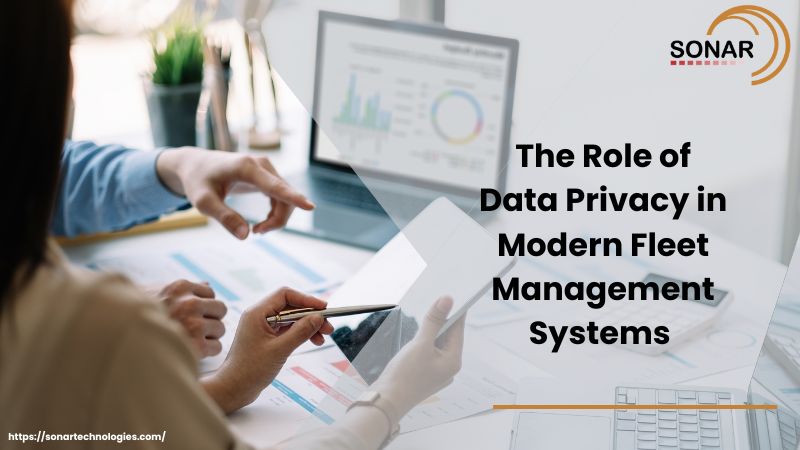Fleet management services are more efficient and intelligent today, powered by advanced telematics, GPS monitoring and real-time data analysis. At the same time, though, greater use of data in fleet operations has also raised humongous issues around data privacy. For companies that manage fleets by smart workforce — be they logistic companies, delivery organisations, or utility companies — an understanding of the place of data privacy in contemporary fleet management systems software is not merely a matter of compliance; it’s a strategic necessity.
This blog discusses why data privacy is important in fleet management, what data is harvested, and how it can be safeguarded by companies without compromising operational insight.
Why Data Privacy Is Important in Fleet Management
Fleet management systems software is information-intensive. These fleet management systems record vehicles, record driver performance, record route information, record engine readings, and so forth. While all that information maximises productivity, safety, and expense, the information also has a threat if not safely protected.
Data privacy matters because of a myriad of reasons:
- Legal Compliance: Companies must abide by data privacy laws such as the EU’s General Data Protection Regulation (GDPR), US’s California Consumer Privacy Act (CCPA), and other region-specific legislation. Breach attracts massive fines.
- Reputation Management: Customers, clients, and employees are privacy conscious. Breach of data can lead to loss of trust and damage company reputation.
- Risk Minimisation: Financial loss, business disruption, and compliance legal issues may be triggered by cyberattacks and data breaches. Data protection reduces these risks.
- Privacy of Employees: There is largely personally identifiable information (PII) in most forms of fleet data involving drivers. Such includes driving behavior, location information, and in some cases even health and biometric information. Employers are responsible for handling this information appropriately.
Types of Data Collected in Fleet Management Systems
To appreciate the privacy risks, one must consider the types of data being collected in a cutting-edge fleet environment:
- Location Data: Real-time GPS Fleet Management System data shows where a vehicle is, where it’s gone, and how long it was at a place.
- Driver Behaviour Data: Speeding, braking, acceleration, idling time, and handling a mobile phone while driving.
- Vehicle Diagnostics: Data from the engine control unit (ECU), fuel consumption, state of the battery, and maintenance reminders.
- Route and Schedule Information: Scheduled versus actual routes and time records.
- Communication Data: Driver messages sent and received, and dispatcher messages sent and received might be recorded or logged.
- Video and Camera Footage: Dashcams and in-cab cameras can record vision data, usually with sound and personal data accompanying it.Employee Records need to be aligned with HR solutions, data such as driver’s licence data, medical certificates, and employment background are stored.
With all this information and when all of this is connected, a clear picture of a person’s daily routine needs to be established. In the wrong hands or revealed, it can be disastrous.
Principal Data Privacy Challenges for Fleet Management
Contemporary fleet solutions are convenient but introduce a new privacy concern:
1. Lack of Transparency
Drivers and other staff are not always aware of what information is collected and for what purposes they are collected. There is potential for surveillance or exploitation fear here.
2. Consent and Purpose Limitation
Firms must make sure data are being accumulated for valid, well-defined reasons and proper consent being provided where necessary. Accumulating data just because it is convenient to do so may be against the data protection legislation.
3. Storage and Data Retention
Data being retained for longer periods of time than necessary puts risks out. Few firms have a good data retention strategy, subjecting them to risk.
4. Third-Party Access
Third-party providers are usually employed by fleet systems for analysis, cloud storage, or telematics. In case the providers do not have proper privacy controls, information can be accessed or exploited.
5. Cybersecurity Risks
Unsecured networks, poor passwords, and old software can leave fleet systems vulnerable to hacking, ransomware, or data exposure.
Best Practices to Ensure Data Privacy in Fleet Operations
To safeguard personal information while yet maintaining smart fleet systems, organisations need to implement proper data privacy practices. Follows key practices:
1. Data Minimisation
Collect only strictly necessary information to operate the fleet. For instance, rather than having high-resolution video 24/7, record only when there is an incident or a violation of safety.
2. Transparent Privacy Policies
Offer employees simple-to-read privacy policies that explain what information is gathered, how it is used, to whom it is shared, and for how long. Trust and transparency are established by doing this.
3. Role-Based Access Controls
Restrict access to confidential data according to the role of the employee. A mechanic may be granted access to vehicle diagnostics but not to driver behavior data.
4. Encryption and Secure Storage
GPS Fleet Management System helps to encrypt data in transit (e.g., GPS signals) and in rest (e.g., stored data). Mandate cloud storage providers to meet industry standards.
5. Regular Training and Awareness
Educate employees on data privacy regulations and company policies. Employees must be educated on how to handle data responsibly as well as how to report the breach in a timely fashion.
6. Vendor Due Diligence
When utilising third-party fleet management services, ensure that vendors are compliant with relevant privacy legislation and utilise strong security protocols. Always obtain Data Processing Agreements (DPAs) from vendors.
7. Automatic Data Retention Policies
Put into place automatic rules to delete expired or unused data. This reduces storage cost and risk.
8. Incident Response Planning
Have a concise plan to respond to data breach incidents, such as notification of affected parties and regulatory authorities within the stipulated time periods.
Conclusion
Fleet management services today are not all about cars and routes anymore — it’s all about data. As more interconnected and smart fleet systems become the standard, companies should also become more accountable in how they manage data.
Data privacy isn’t a checkbox on a statute. It’s a foundational component of ethical, secure, and efficient fleet operations. Organisations that are greatly troubled by privacy will be more likely to manage risk, establish trust, and create long-term value in a data-intensive industry.
Through the implementation of a solid data privacy strategy, fleet operators will be guaranteed compliant, competitive, and trusted in a fast-changing digital world.

